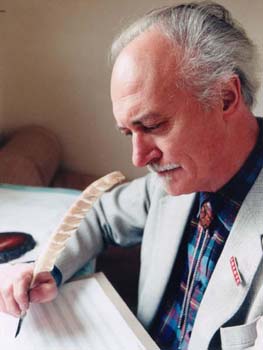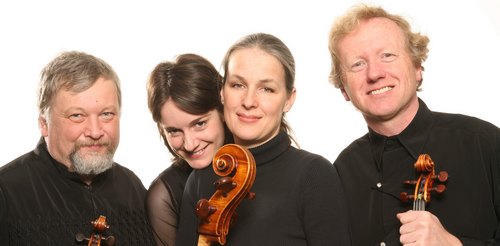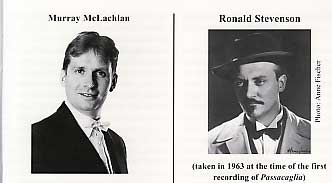|
Ronald Stevenson at 80 
Festival curated by Murray McLachlan at St John's Smith Square - London 11-13 April 2008
reviewed by Evan Dickerson, Aleks Szram & Peter Grahame Woolf
The Artsong Collective: ‘Songs of Innocence’
Moira Harris (soprano), Phillida Bannister (contralto), Wills Morgan (tenor), Paul Keohone (baritone), Richard Black (piano)
11 April 2008
Introduction – baritone
The Shepherd – soprano
The Ecchoing Green – tenor
The Lamb – soprano
The Little Black Boy – tenor
The Blossom – soprano
The Chimney Sweeper – contralto
The Little Boy Lost – tenor
The Little Boy Found – baritone
Laughing Song – soprano
Cradle Song – contralto
The Divine Image – quartet
Holy Thursday – tenor
Night – soprano
Infant Joy – contralto and tenor
Spring – baritone
Nurse’s song – soprano and contralto
A dream – soprano
Introduction to the chorale – piano
On Another’s Sorrow – acapella quartet
To begin at the beginning - well, near it anyhow - seems right when celebrating any anniversary. Particularly so when celebrating the life and work of Ronald Stevenson (B. 6 March 1928) cultural polymath: composer, master pianist, broadcaster, author, scholar and poet [pictured 2001].
Started in Stevenson’s early teens and completed in 1965 the hour long cycle Songs of Innocence was not performed in its entirety until 1998. Even then no specification of particular vocal ranges was made for the songs of the cycle, so this performance offered one possible allocation of material to voice.
And poetry is all important for Ronald Stevenson. His writing reflects an acute awareness that poetry is best savoured when read aloud or sung. Naturalness of tempo and inflection of the vocal lines also mark out his respect for the texts. Often flowing vocal lines are backed by richly luxuriant piano accompaniments that owe much to Stevenson’s own pianistic skill and also seem to offer subtle debts towards Grainger and Britten. Central to innocence is childhood, so Blake’s poems on the subject form a recurrent theme, to which Stevenson responded with wide-eyed enthusiasm.
Songs of Innocence stands as central to the twentieth century’s flowering of English song, and did much to show his own youthful potential. Alas, and it is a very much regretted, of the singers only Paul Keohone and Moira Harris seemed totally on form. Keohone’s security and richness of tone and Harris’s expressiveness with words both largely eluded Phillida Bannister and Wills Morgan, who both struggled to remain on pitch throughout their contributions. Richard Black’s contribution exceeded that of mere accompanist to weave the songs into a coherent whole through deftness of touch, richness of tone and unassuming delight in pianistic nuance or subtle tempo changes to vary the mood.
A pity then that much of the promise in Stevenson’s music was under-realised by this performance. However, since no recording is yet available, one with soloists fully up to Stevenson’s demands would seem desirable.
Evan Dickerson
Songs of Innocence
Note: No Blake texts were available at the performance and only Keyhone's words were sometimes audible.
This contributed to a dampening beginning to the Festival, giving ample time during the hour's duration for thought about the whole question of song settings of classic poetry. Few listeners nowadays know their Blake 'by heart', which used to be part of education in the earlier part of the last century and the one before... Texts are essential for concerts and CDs. * 
That blunder in the presentation of this opening concert was however soon eclipsed by the superb Martinu String Quartet in Janacek and Stevenson's String Quartet ‘Voces Vagabundae' which they have recorded on ARCO DIVA UP 0052-2 131.
They have a vast repertoire and their account of Janacek No 2 had a rare inwardness and 'breathing together' in the homophonic passages, reflecting the composer's subtitle "Intimate Letters". I look forward to hearing them again, and am pleased to note that they also play Sibelius' "Voces Intimae". [Editor]
The three concerts that started the first full day of the Stevenson festival gave listeners the opportunity to hear some of the influences upon Stevenson’s music – Busoni and Grainger formed central parts of this, but so too did the words of poets such as Hugh MacDairmid and William Soutar.
Young Artists’ Piano Recital, including transcriptions of Liszt & others, also music by Alkan and works by Stevenson
Sam Liu, Yeon-Seok and Jesse Beaumont of Trinity College of Music.
Three prize winning piano students from Trinity College of Music began proceedings. Yoon-Seok Shin was suitably full of the joys of spring in the world premiere of Sam Liu’s transcription of Walton’s Façade tango-pasodoble, before delivering crisply articulated accounts of Stevenson’s arrangement of Charpentier’s Louise romance. Mendelssohn’s Midsummer Night’s Dream wedding march arranged by Liszt predictably owed more to the latter than the former. A welcome return to upbeat lightness of touch in the form of Kapustin’s Sonatina op. 100 completed the programme.
The second pianist, Sam Liu, revelled in the chordal richness of Bach-Stevenson’s Komm, süsser Tod, and concentrating on the structure of Busoni’s Sonatina Seconda, before delivering Liszt’s arrangement of Wagner’s Liebestod in a manner that underlined the slow but sure burn of the music’s emotional drama.
Jesse Beaumont’s programme concentrated on Liszt, with Transcendental studies 4, 5 and 6 forming the bulk of his offering. The fifth was the most convincing as a whole, owing much to his lightness of touch. Rimsky-Korsakov’s bumblebee was perfunctuarily swatted down on the keyboard after a manic flight, before the combined spectres of Alkan, Chopin and Rimsky-Korsakov were efficiently called forth in Stevenson’s atmospheric Etudette.
Busoni - ‘Fantasia Contrappuntistica’
Allan Schiller, John Humphreys (pianos)
Allan Schiller and John Humphries, long time piano partners, offered the festival’s most extensive offering from Busoni, the Fantasia Contrappuntistica. In contrast with the last time I heard the work given by a single pianist, this account was texturally light and spacious.
Together they coordinated well and delivered much that showed an awareness of Bach before moving the piece into the realm of pure Busonian fantasy, with its constant streams of emotion overrunning one another. A moving experience.
Grainger - Lincolnshire Posy/Fantasy on Porgy and Bess
Penelope Thwaites and John Lavender (pianos)
Penelope Thwaites and John Lavender took up the cause of Grainger, with four pieces from the Lincolnshire Posy. Mixing jauntiness with the refined rustic mood that Grainger caught so well in his writing they made their enjoyment of playing the work palpable. Grainger’s Fantasy on Porgy and Bess continued in much the same vein, with its juxtaposition of the musical numbers showing a keen sense of wit and imagination at work.
The Artsong Collective: Recital 2
The second of the Artsong Collective recitals had examples of songs by Stephen Foster, Coleridge-Taylor, van Dieren, and Francis George Scott at its core. They are, we were told all songs that Ronald Stevenson loves, even if their performance was textually indistinct.* Of the three Stevenson cycles presented, the most successful by far in performance terms was Hills of Home, settings of Robert Louis Stevenson. Although Ronald Stevenson was effusive in his praise of Scots poets following the recital, the words of MacDairmid and others made little impact in either English or Scots.*
Evan Dickerson
* See my note above on this important topic PGW
Young Artists’ Recital
On this showing it would appear that Chetham’s School of Music is in a rude state of health, as we were treated to a series of high-quality performances from its rising stars. There was so much applause that the concert finished half-an-hour later than scheduled.
Pianist Sebastian O’Shea-Farren showed a talent for voicing in A Rosary of Variations on O Riada’s Irish Folk Mass. He was followed by harpist Catherine Derrick, who give a magical rendition of Two Scottish folksong arrangements. As she began the Two Cambrian Cantos, I was left feeling that music cannot get any better than this. Her sound filled the hall, yet retained an intimate quality. Most impressively memorised as well.
Next on were the Pan-Celtic Wind Quintet, performing six folk-song arrangements made by Stevenson. They captured the style well, with good ensemble balance and tuning.
Pianist Arsha Kaviani dazzled in a set of Chopin-Godowsky etudes; No.42 on Op.25 No.11 was exciting, impassioned bravura playing - with an impressive CV already in the making, we will surely be hearing more of him in the future.
The Chetham’s String Quartet seemed out of place in a student concert, appearing consummately professional in every aspect. They gave commited and nuanced performances of three works by Stevenson: Four Meditations, Busoni-Stevenson Quartettino, and Recitative and Air (DSCH) for string quartet. The latter was especially plaintive and heartfelt - a truly mature performance.
RAM pianist Christopher White rounded-off the concert with a superlative rendition of Busoni’s All’Italia! In modo napolitano, and the best performance of the Toccata that I’ve ever seen. White played with exuberance and dedication, with an impressive clarity of characterisation. He earned a standing ovation from Ronald Stevenson and Murray McLachlan - men in the know.
Passacaglia on DSCH Op.70
Murray McLachlan - piano
This concert was the heart of the festival, and those who came to hear Stevenson’s most celebrated work did not leave disappointed. The problem in such a huge work is in balancing the various climaxes, and it is to McLachlan’s credit that he solved this problem comprehensively. His mastery of controlling dynamic contour over large stretches of time, and his flexible approach to tempo, ensured that the work did not outstay its welcome, instead becoming ever more gripping until the final note. It was rapturously received with a standing ovation, and one only hopes that some of the young pianists in the audience might be persuaded to take the piece up. Given the obvious quality of the music, and the impact it makes, it is frankly absurd that so few pianists play it. It is difficult, yes, but as McLachlan showed last night it is well worth the effort.
Aleks Szram
See Robert Matthew-Walker's overview of the first two days on Classical Source and Richard Whitehouse's report of the final day, which Musical Pointers was unable to cover.
One more for the websites/broadsheets debate; nothing on this important event seen(yet?) on any of the latter !
q.v. the internet medium does offer - in addition to certain technological possibilities - an opportunity to dismantle and challenge the monopoly of opinion that established forms of criticism undeservedly enjoy (Gordon Downie). [Editor]
Stevenson's Passacaglia on DSCH
There are two excellent recordingsof the monumental Passacaglia available on CD; the Composer's own historic recording of 1963 [Appian APR 5650] and a later one by Murray McLachlan endorsed by the composer - "He has no greater appreciator of his pianism than myself" [Divine Art 25013, 2003]. Both are recommendable; Stephen Sutton, the producer, tells me that "Ronald loved Murray's version - until we decorated the office I had his letter of fulsome praises framed on the wall !!!"
Musical Pointers would welcome a comparative review of these recorded performances by a Stevenson enthusiast, of whom there are many... [Editor]
P.S. We weren't able to hear Douglas Finch premiere a commssioned work cimposed for this concert, but you can see & hear him playing a suitably flamboyant improvisation on Happy Birthday for Ronald Stevenson's 80th on YouTube. PGW
|



